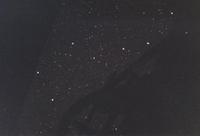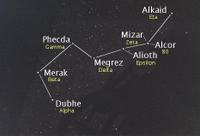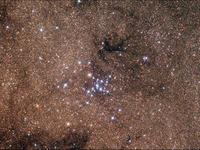 In a fantasy realm the constellations will be completely different (unless that realm is a mirror-universe of this one, of course). Your world will be sitting somewhere else, or somewhen else. That means the view at night of the neighboring universe will look different.
In a fantasy realm the constellations will be completely different (unless that realm is a mirror-universe of this one, of course). Your world will be sitting somewhere else, or somewhen else. That means the view at night of the neighboring universe will look different.Our night sky has been mapped into 88 different regions. Each houses a collection of stars that are together in the sky – or at least apparently together. The only problem is, this map was drawn as if all the stars were the same distance, as if there was a celestial sphere about the Earth – a dome of stars. But we know that while some stars are close, others are very far away. It’s like looking at a tank of glowing fish, some may look like a group, but if you walked around to the side, they might be all spread out. Also, like fish, stars move. Some are moving away from us, others towards us, and many are moving across the sky. The movement is relatively slow, in that it takes hundreds, or even thousands of years before the movement is obvious. If your world is the Earth a million years ago, or a million years hence, the arrangement will have changed.
 These regions – constellations – were mostly named in ancient times. Today we still retain many of the names used by Western Civilization. Orion, Draco, Cassiopeia, Leo, and so forth were so named thousands of years ago. Some are newer: Little groups of stars that didn’t really fit in the main constellations. Musca (the Fly) is a good example. (Here's a good source list of constellations, if you are curious.)
These regions – constellations – were mostly named in ancient times. Today we still retain many of the names used by Western Civilization. Orion, Draco, Cassiopeia, Leo, and so forth were so named thousands of years ago. Some are newer: Little groups of stars that didn’t really fit in the main constellations. Musca (the Fly) is a good example. (Here's a good source list of constellations, if you are curious.)In a fantasy world, what will the characters see when they stare up at the night sky? Well, it all depends. If the world is in a galactic arm of a spiral galaxy, very likely they’ll see a sky much like our own, except all the stars will be scattered across it in its own unique way. Likely, your character’s social history included a similar connect-the-dots sort of naming convention. Then, too, your character will see constellations in the sky, but named after his or her own mythic or real heroes of the past. It has been mankind’s tendency to see the divine in star patterns, whether gods, heroes, or mythic animals. Your world’s beings may be similar, or completely different.
But perhaps your world isn’t located in the outer neighborhood of a nice spiral galaxy. Maybe yours is closer to the center, or in a small, dense cluster of stars, or in the middle of a gaseous nebula, or a dark dust cloud. These conditions would cause the sky to look very different, very different indeed.
 In a dense-star neighborhood, the sky would be filled with brightness. There would be so many shining stars that it would be brighter than our own full moon. Some stars could be close enough to be shining beacons unto themselves. Which could be true even in less populated areas of the universe. But I'll talk more about close stars on another day...
In a dense-star neighborhood, the sky would be filled with brightness. There would be so many shining stars that it would be brighter than our own full moon. Some stars could be close enough to be shining beacons unto themselves. Which could be true even in less populated areas of the universe. But I'll talk more about close stars on another day... Or, put your system in a gaseous nebula, and the sky would be aglow with wispy gossamer trails and whorls of faint light. Like some eerie abstract watercolor, the night sky could be a surrealistic artist’s dream.
 One could combine the two, for many dense star clusters are full of gas and dust nebula.
One could combine the two, for many dense star clusters are full of gas and dust nebula.And lastly, the world might be isolated in a dark cloud, an area of space filled with dust. Though there may only be one particle per cubic yard, if it goes on for ten light years, that’s enough to block out all neighboring light. The world’s night sky would be total darkness. There would be no constellations to name.
Choosing your night sky, and any constellations, will help to reveal the history of your fantasy culture. A sky full of animals will indicate a society where animals are highly revered. A night sky of war heroes, gods, and monsters tells us something else.
Constellations were important to the early navigators. The stars were used to tell the position of ships in the night, and to confirm the seasons of the year. And of course, constellations have been used to predict the future behavior of people (astrology). The twelve signs of the zodiac are the twelve constellations that the sun passes through during the year (It doesn’t literally pass through, it’s all relative. The Earth moves around the sun, which means the background of stars behind the sun changes throughout the year.)
Images from Portraits of Stars and their Constellations and Astronomy Picture of the Day.

4 comments:
Thanks Bruce! Love the info and it looks like other people are enjoying it too! That's SO cool! :D
I think I was this for my nightsky:
"Or, put your system in a gaseous nebula, and the sky would be aglow with wispy gossamer trails and whorls of faint light. Like some eerie abstract watercolor, the night sky could be a surrealistic artist’s dream.
One could combine the two, for many dense star clusters are full of gas and dust nebula."
I'm coming back to this. How difficult will this be to keep track of? Will I have to come up with 12 constellations then as well?
Re: 12 Constellations
You don't need to come up with twelve constellations. Our zodiac has twelve because there are 12 months in a year. The twelve zodiac signs once matched up with the twelve months... but there's something called the Progression of the Equinoxes. But that can wait for another lecture.
In a fantasy world you only need to be aware of the fact that your constellations won't match up with Earth's. Meaning you shouldn't have a character point to the heavens and say, "look, there's Scorpio." However, you could have him say, "look, there's Thiral's Hammer rising in the east. The farmers will be sowing the fields soon."
Re: Posting
I like and welcome posts from readers of my blog, with comments, ideas, and questions. However, in today's world of posting bots and spam, I will delete any post that doesn't include a relevant reference to my blog. Meaning, if you write only that 'your blog is cool', it will be deleted. Please include a reference in the text so I know a human actually read my blog.
Post a Comment